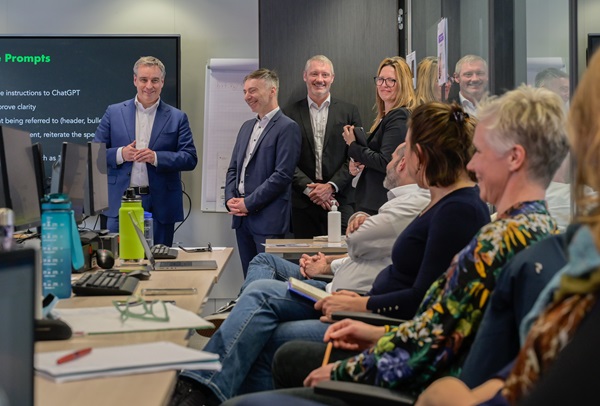 (left) Claude Meisch, Luxembourg’s Minister of Education, Children and Youth;
Credit: MENEJ
(left) Claude Meisch, Luxembourg’s Minister of Education, Children and Youth;
Credit: MENEJ
On Wednesday 27 March 2024, Luxembourg’s Minister of Education, Children and Youth, Claude Meisch, visited the Digital Learning Hub (DLH) and 42 Luxembourg in Esch-Belval, where he attended several courses in the field of digital technologies and had an exchange with students and staff of the two training entities.
With 6,000 registrations (44% of which by women) and 700 courses organised since its launch in 2022, the DLH has quickly established itself as an essential reference in the field of digital technology training, Luxembourg’s Ministry of National Education, Children and Youth noted.
Offering face-to-face courses in Esch-Belval, the DLH offers a diverse range of training in different areas such as programming, blockchain, cybersecurity, data sciences, artificial intelligence, cloud, systems administration, augmented and virtual reality, governance IT and digital design.
The courses offered range from individual sessions of a few hours to complete learning paths. This flexible approach aims to participants to develop their skills gradually and in a manner adapted to their needs, the ministry added.
The DLH offers courses suitable for beginners as well as intermediate and advanced levels. In 2023, the participants were:
- 56% registered with ADEM;
- 26% private sector employees;
- 9% public sector employees;
- 7% students;
- 2% applicants/beneficiaries of international protection.
With the demand for information technology specialists in Luxembourg constantly increasing, the DLH plays a central role in training the skilled, even highly skilled, workforce that is needed to meet market needs employment. Indeed, according to the ADEM sector study, 42% of declared job offers are in the IT field. Thus, this economic sector represents excellent employment opportunities and the DLH contributes to retraining (reskilling) that is both rapid and effective through precise, short and accessible training, the ministry emphasised.
The DLH is equipped with the necessary instruments to assume an active role in the training of future digital specialists in Luxembourg and noted it is determined to continue to offer quality courses to best respond to the evolving needs of the job market and the country’s digital transformation.
More information on the DLH Luxembourg is available via the official website: https://dlh.lu/.
42 Luxembourg
In addition to its regular training activities, the DLH manages 42 Luxembourg, the free and innovative programming school, where 143 students, including 17% women, started the course on 19 February 2024.
The first 42 school was founded in Paris in 2013. To date, 42 has grown into an international network consisting of 54 campuses in 31 countries. Its training program enjoys an excellent reputation thanks to a reported record of a 100% hiring rate for students.
42 operates based on a progressive pedagogy which is becoming more and more widespread, the ministry highlighted. Moving away from traditional teaching methods, 42 Luxembourg has no teachers, no lessons and no classes. Project-based and self-directed learning as well as peer exchange are the main pillars of 42's pedagogy.
Gamification builds the structure of the training program to 42, which means that students do not progress in years of study, but in levels ranging from 1 to 21 (like in a game). Each level increases in difficulty and builds on the knowledge gained from the previous one. In addition, the 42 programme is divided into two parts: the common core and the second part. The common core focuses on the fundamentals of programming while the second part covers more specific areas of IT, such as web development, cybersecurity, artificial intelligence, etc.
Each student works and progresses in their own way and at their own pace. This is why the campus is open 24 hours a day, seven days a week, which allows students to manage their time at their convenience. Therefore, the duration of training depends on the individual's commitment to the programme. Generally, the common core is completed within eight to eighteen months.
To join the programme, students have to go through the Swimming Pool. This is an intense four-week trial period during which the candidate is confronted with various programming projects. The swimming pool, like the programme itself, requires considerable personal investment. In addition to giving an idea of what to expect, it aims to test the participants’ level of motivation and determination. At the same time, this is a way for the individual to determine if this method of learning is right for them. The next Swimming Pools to join 42 Luxembourg will begin on 8 July 2024 and 2 September 2024.
At the end of his visit, Minister Meisch welcomed the success of the digital technology training offered at DLH and 42 Luxembourg: “The exchanges with students and staff were very enriching. The highly specialised courses offered at DLH enable the economic sector to maintain the skills and qualifications of its staff at the highest level. With 42 Luxembourg, we have also managed to complete the offering of our educational landscape by proposing an innovative model that encourages independent learning, teamwork and problem solving rather than the formal transmission of knowledge.”








